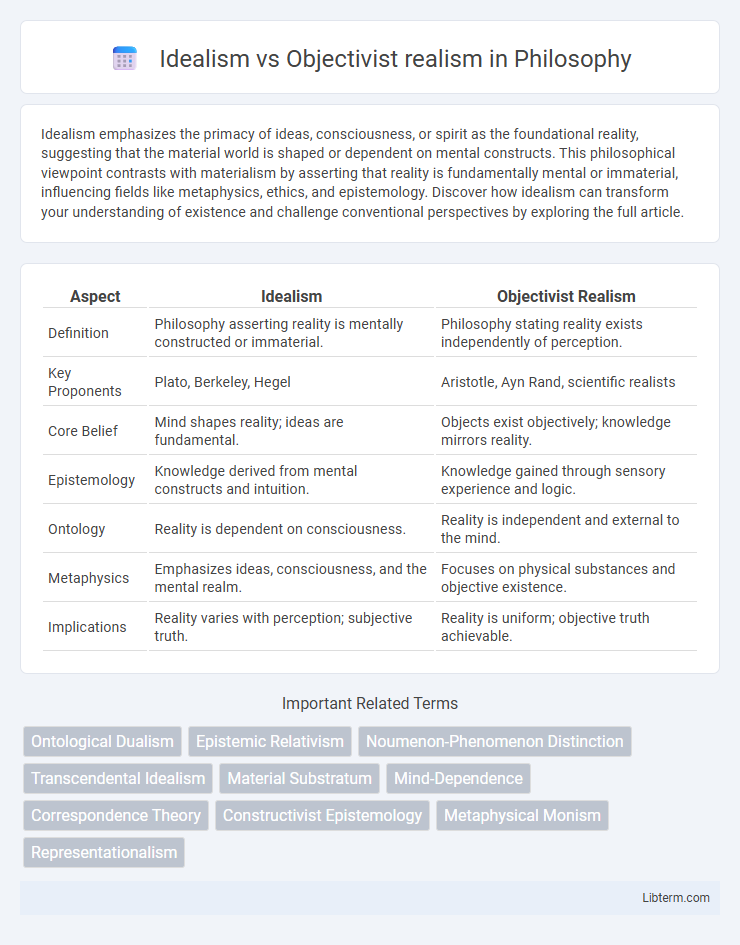Idealism emphasizes the primacy of ideas, consciousness, or spirit as the foundational reality, suggesting that the material world is shaped or dependent on mental constructs. This philosophical viewpoint contrasts with materialism by asserting that reality is fundamentally mental or immaterial, influencing fields like metaphysics, ethics, and epistemology. Discover how idealism can transform your understanding of existence and challenge conventional perspectives by exploring the full article.
Table of Comparison
| Aspect | Idealism | Objectivist Realism |
|---|---|---|
| Definition | Philosophy asserting reality is mentally constructed or immaterial. | Philosophy stating reality exists independently of perception. |
| Key Proponents | Plato, Berkeley, Hegel | Aristotle, Ayn Rand, scientific realists |
| Core Belief | Mind shapes reality; ideas are fundamental. | Objects exist objectively; knowledge mirrors reality. |
| Epistemology | Knowledge derived from mental constructs and intuition. | Knowledge gained through sensory experience and logic. |
| Ontology | Reality is dependent on consciousness. | Reality is independent and external to the mind. |
| Metaphysics | Emphasizes ideas, consciousness, and the mental realm. | Focuses on physical substances and objective existence. |
| Implications | Reality varies with perception; subjective truth. | Reality is uniform; objective truth achievable. |
Introduction to Idealism and Objectivist Realism
Idealism asserts that reality is fundamentally mental or immaterial, emphasizing the role of perception and consciousness in shaping existence. Objectivist realism, rooted in Ayn Rand's philosophy, posits that reality exists independently of consciousness, and knowledge is acquired through objective observation and reason. These contrasting paradigms frame the debate over whether reality is mind-dependent or exists objectively outside human perception.
Defining Key Philosophical Concepts
Idealism asserts that reality is fundamentally mental or immaterial, emphasizing the role of perception and consciousness in shaping existence. Objectivist realism, by contrast, holds that an external reality exists independently of human thought and can be known through objective observation. Key philosophical concepts include the nature of knowledge, the existence of objects, and the relationship between mind and reality, with idealism prioritizing subjective experience and objectivist realism emphasizing empirical evidence.
Historical Origins and Influential Thinkers
Idealism traces its historical origins to ancient philosophers such as Plato, who emphasized ideas as the fundamental reality, while later figures like Immanuel Kant shaped transcendental idealism by arguing that knowledge structures experience. Objectivist realism emerged prominently through Aristotle's empirical investigations, asserting that reality exists independently of perception, a viewpoint further developed by modern thinkers like Ayn Rand who emphasized objective reality and rational self-interest. The philosophical debate between these traditions centers on whether reality is mentally constructed or exists as an objective domain accessible through reason and sensory experience.
Core Principles of Idealism
Idealism posits that reality is fundamentally mental or immaterial, emphasizing the primacy of consciousness and ideas in shaping existence. Core principles include the belief that the external world depends on the mind for its existence and that knowledge is constructed through mental perception. This contrasts with Objectivist realism, which asserts that reality exists independently of human thoughts or perceptions.
Fundamental Tenets of Objectivist Realism
Objectivist realism is grounded in the belief that reality exists independently of human consciousness, emphasizing that objects possess an objective existence with properties that are discoverable through reason and empirical observation. It asserts that knowledge reflects the external world as it truly is, stressing the importance of logic and evidence in forming accurate perceptions. Contrasted with idealism, which posits reality as mentally constructed, objectivist realism upholds that facts are absolute and remain true regardless of beliefs or perceptions.
Contrasting Perspectives: Reality and Perception
Idealism posits that reality is fundamentally shaped by the mind, suggesting that perception constructs or influences what is considered real. Objectivist realism maintains that reality exists independently of human consciousness, with objects having an existence and properties regardless of observation. This contrast highlights the debate on whether reality is mind-dependent or exists as an objective entity external to perception.
Epistemological Differences: How We Know
Idealism asserts that knowledge is fundamentally shaped by the mind's perceptions, asserting that reality is mentally constructed and accessible through introspection and sensory experience within consciousness. Objectivist realism holds that knowledge is obtained by directly observing an external, mind-independent reality, relying on empirical evidence and logical reasoning to discover objective truths. These epistemological differences emphasize subjective construction of knowledge versus objective discovery as the basis for understanding reality.
Real-World Implications and Applications
Idealism, emphasizing the mind's role in shaping reality, influences fields like education by promoting constructivist learning approaches and mental health through cognitive therapies. Objectivist realism, asserting an independent external reality, underpins scientific methodologies and technological advancements by prioritizing empirical evidence and objective measurement. These philosophical frameworks shape policy-making, scientific inquiry, and ethical considerations in areas such as environmental conservation and artificial intelligence development.
Criticisms and Debates in Contemporary Philosophy
Idealism faces criticism for its rejection of an independent external reality, as critics argue it struggles to explain the consistency and objectivity of the physical world, while objectivist realism is challenged for its reliance on metaphysical assumptions about the existence of mind-independent entities. Debates focus on the epistemological implications of each stance, with idealists emphasizing the constitutive role of perception in reality and objectivist realists defending a reality accessible through empirical observation irrespective of human cognition. Contemporary philosophy continues to explore these tensions, questioning whether reality is fundamentally mental or external, and how this impacts truth, knowledge, and scientific inquiry.
Conclusion: Bridging Idealism and Objectivist Realism
Bridging Idealism and Objectivist Realism involves recognizing that subjective experiences and objective realities are interdependent rather than mutually exclusive. Integrating idealist insights on consciousness with objectivist commitments to external facts encourages a more comprehensive epistemology that values both perception and independent existence. This synthesis promotes a nuanced understanding where reality is shaped by the mind's interpretation without denying the presence of objective structures.
Idealism Infographic

 libterm.com
libterm.com